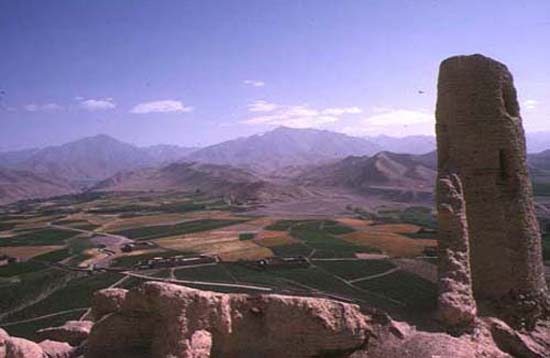
Afghanistan RPCV Thomas Gouttierre says Kabul's kids will soon be spelling 'Omaha'
Kabul's kids will soon be spelling 'Omaha'
Mar 16, 2002 - National Journal Author(s): Warner, Mary Beth
NATlON BUILDING
Thomas Gouttierre acknowledges that his latest project is "not a walk in the park by any stretch." As dean of international studies and programs at the University of Nebraska (Omaha), Gouttierre joined forces last month with the U.S. Agency for International Development in a massive undertaking: printing enough textbooks- somewhere between 4 million and 5 million-in time for the scheduled reopening of schools in Afghanistan on March 23.
That project, called ARRENA, or America's Rapid Response to Education Needs in Afghanistan, will provide textbooks in both the Dari and Pashtu languages to Afghan students in all subjects for grades K-12. The project is a major part of international efforts to get schools ready for the school year in a country where fighting has recently intensified, the interim government remains on shaky ground, and many schools lack even the most basic supplies and infrastructure, such as toilets and heat.
Gouttierre and his university have a long history in the country. Nebraska's Center for Afghanistan Studies-the only one of its kind in the United States-was started in 1973, and from 1986 to 1994, the center received more than $50 million in grants from U.S. AID for education projects in Afghanistan. During those years, about 8,800 Afghan teachers were trained and 13 million textbooks were printed and distributed.
In 1994, the United States stopped financing the project as part of an overall withdrawal from Afghanistan. Since then, the university's staff and faculty have held on to old textbooks and the school curriculum, and they have kept open a tiny office in Peshawar, Pakistan, with the hope that they might someday be able to work in Afghanistan again.
After the Taliban fell, Gouttierre and the university went to the country's interim Ministry of Education and offered the old curriculum for the new school year, knowing, however, that revisions would have to be made. The Afghan officials accepted the offer. A letter from the education ministry to U.S. AID asking for help with the textbook printing sped up the process, AID officials said, and last month, the university was awarded a $6.5 million contract.
REBUILDING SCHOOLS: An Afghan schoolgirl writes on a war-damaged blackboard in the town of Mazar-i-Sharif in January.
Next came the task of updating the textbooks. Chris Brown, program development coordinator for U.S. AID's Central Asia Task Force, said that the United States was "sensitive" in its approach to the editing, which had to be approved by the Afghan education ministry. "The last thing we wanted to do was tell another country what to teach its children," Brown said.
A panel of officials from the ministry reviewed the textbooks, as did a panel organized by U.S. AID made up of 11 Afghans, including former professors and journalists. The latter panel was asked to adhere to three principles that, Brown said, "are consistent with the principles of Islam and are fundamental to our principles as a nation."
Specifically, the panel was asked to eliminate any references that would promote violence or killing; delete anything teaching children to hate or discriminate against another group, such as women, because of who that group is; and to ensure that the books would not teach Afghan children to hate any other country.
All references to jihad, for example, were deleted or rewritten, and a 1980s poem extolling the virtues of fighting the Communists and condemning the teachings of Karl Marx was taken out, Brown said. Most of the changes were minor, and about 10 to 30 alterations were made per book, he said.
A plant in Peshawar is printing the books, which will be stored in warehouses operated by the United Nations Children's Fund. UNICEF will also distribute the textbooks. UNICEF says that restarting the Afghan school system, which had been badly damaged under the Taliban, will be its biggest logistical operation for many years: It will have to provide about 6,000 metric tons of supplies, including chalkboards, pens, pencils, notebooks, geometry sets, and slates.
Other American universities also want to help rebuild Afghanistan's educational system. Purdue University signed an agreement in February with the Afghan minister of higher education that gives Purdue the authority to seek funding from U.S. and international agencies for the rebuilding of the agriculture, engineering, and technology schools at Kabul University.
Zarjon Baha, a former dean of Kabul University's engineering school who now is on Purdue's faculty, said he and two other professors plan to be at the opening of Kabul University this month to get a better sense of what the institution needs. After that, and a tentatively scheduled two-week workshop in Kabul in May, Purdue will submit proposals to U.S. AID.
Meanwhile, Gouttierre, who went to Afghanistan in the 1960s as a Peace Corps volunteer and later headed the Fulbright Foundation office there, plans to have 10 million textbooks printed by the end of the year when his contract with U.S. AID expires. He also hopes to have as many as 20 teams of teacher trainers working throughout the country. He's pleased that his university is part of the challenging work of rebuilding a country. "In a sense, it's the first time we've been able to go to Afghanistan with a message of hope for a long, long time." a
Mary Beth Warner is a correspondent for National Journal News Service.
Copyright National Journal Group, Inc. Mar 16, 2002
